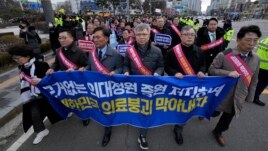26 February 2024
South Korea's government has warned young doctors to return to work before February 29 or face possible punishments.
About 9,000 young doctors started walking off the job early last week to protest a government plan to increase the number of students accepted to medical schools.
The doctors are in the early part of their careers. They are known as residents or interns. These young professionals generally assist or observe more experienced doctors in their work.

Doctors march toward the presidential office during a rally against the government's medical policy in Seoul, South Korea, Sunday, Feb. 25, 2024. (AP Photo/Ahn Young-joon)
The government wants to expand the yearly number of new medical student admissions by 2,000. The plan also offers incentives to doctors if they specialize in areas facing shortages, such as doctors who treat children or work in emergency rooms.
Officials have said the plan is necessary to serve South Korea's aging population. The country's current doctor-to-patient ratio is among the lowest in the developed world.
But the striking doctors say the nation's universities are unprepared to deal with additional students. They have also said the change would not solve doctor shortages in some areas of the profession.
Under South Korean law, the government can order doctors and other medical workers back to work if there is a major risk to public health. Refusal to obey such an order can result in the suspension of licenses and up to three years in prison or a $22,480 fine. Those who receive prison sentences would have their medical licenses canceled.
South Korea's Vice Health Minister, Park Min-soo, told reporters Monday the government would not seek any punishments against striking doctors who returned by February 29. "If they return to the hospitals they had left by then, we won't hold them responsible" for any damage caused, Park said. He added, "It's not too late. Please, return to patients immediately."
The government said those who do not return to work by the end of the month could be punished with at least a three-month suspension of their medical licenses. Doctors who continue to strike could also face additional legal steps and possible court trials.
Hyeondeok Choi is a partner at the law firm Daeryun, which specializes in medical law. He told the Associated Press it would be highly unlikely the government would suspend the licenses of all striking doctors because of the possible harm that could cause. Some industry observers said a more likely action would be for the government to only punish strike leaders.
The AP reports there are about 13,000 medical interns and residents working in South Korea. These workers represent about 30 to 40 percent of all the doctors at some major hospitals.
Earlier this month, the government announced it would permit universities to admit 2,000 more medical students starting next year. Officials say the plan calls for adding up to 10,000 new doctors by 2035.
Public opinion studies have shown that about 80 percent of South Koreans support the government's plan. But striking doctors have said they worry that doctors facing increased competition could start treating patients for conditions they do not have. This, they added, could put new financial pressures on the country's medical system, which would have to pay for the additional costs.
Critics have noted doctors currently receive one of the highest pay rates of any workers in South Korea. They argue that increasing numbers creates greater competition and can lower doctor incomes.
Vice Health Minister Park said the country's services for emergency and critical patients remain stable. He noted that public hospitals had extended their working hours and military hospitals were opening their emergency rooms to civilian patients.
I'm Bryan Lynn.
The Associated Press and Reuters reported on this story. Bryan Lynn adapted the reports for VOA Learning English.
____________________________________
Words in This Story
admissions –n. (pl.) the group of students who are accepted to a school in a given year for a course of study
incentive – n. something that urges a person to act in a particular way
ratio –n. the relationship between two numbers often represented as a proportion in a comparison
license – n. a document giving someone official permission to do or have something
stable – adj. not likely to change or end suddenly